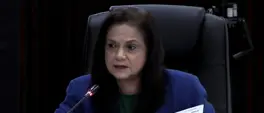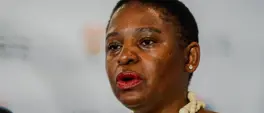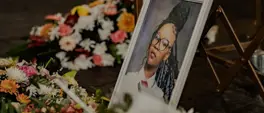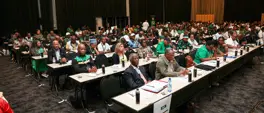TODANI NODOBA: GBV in SA is a demon in danger of being normalised
Todani Nodoba
30 March 2023 | 10:00It’s time our society adopts one of the best strategies of the African tradition - that it takes a village to raise a child, and apply this to the girl child, writes Todani Nodoba.
Quite recently, South Africa has witnessed a renewed spree of reports of gender-based violence and femicides. In February, a popular comedian in Vhembe, Limpopo allegedly murdered his wife brutally and dumped the body in a water-filled hole meant for a pit toilet behind his house.
In March, a dumped lover went and killed a former lover of his partner, and lately, a doctor allegedly brutally murdered his wife, also a medical doctor.
These cases are just a tip of the iceberg. The truth is there are more women out there who continue to be murdered and remain part of the statistics. More shocking is that South Africans are gradually normalising gender-based violence (GBV) and femicide as part of our daily lives.
During my youth, about four decades ago, it was common to find women being beaten by their husbands or partners in public spaces. While she was being beaten, you would find spectators jeering at the woman and calling her names like “sfebe", loosely translated as “bitch.”
I remember that quite vividly and it was acceptable. It’s uncommon to come across such a scene these days, but gender-based violence has escalated to extremely dangerous levels.
The Africa Health Organisation reports that at least 51% of women in South Africa have experienced GBV at some stage in their lives.
The most frightening part is the high level of femicide that seems to soar, daily. World Health Organization (WHO) data shows South Africa’s femicide five times higher than the global average.
Between 2019 and 2020, 2,695 women were murdered in South Africa. When GBV levels soar to more than half of society’s population, it is an outright symptom of a sick society.
If these figures are anything to go by, South Africa as a country is on fire. As the figures continue to escalate, the question we need to ask ourselves is how did we get here?
Respect for women in South Africa, like in many other societies, does not seem to exist. From domestic to school level and society at large, our girls and women are viewed as objects for use by males. This is the hidden part of our society’s culture.
In essence, our young women face the GBV monster on a daily basis. As parents, we pray for our girls and cross our fingers they are safe everywhere, even in schools. This disrespect for women is perpetuated not only by men, but also by women.
However, our women are often the ones who discriminate against young women - those who have children against those who do not have, those who have boyfriends versus those who are single, those who are married and those who are not. Our girls and young women then feel they are left with no option but to get into unstable relationships for conformity, and then they face the music.
This disrespect and discrimination also happens in churches and other structures of society. When our young women reach a particular age without a partner or husband, they are labelled as _lefetwa_, or viewed with suspicion as being among those who are “scared of men”.
Common sense tells that not every young woman or man is for marriage. As a society, we need to open our eyes and see our contribution to GBV. Women need to inculcate respect for the girl child from home. Or else, we’ll keep on witnessing this atrocious bloodsucking monster at work.
Women empowerment is a common cliché, but its implementation is not clearly defined, especially for the girl child.
Our girls need to be taught from a tender age how to be independent and confident. They need to know it is unfair to perpetually remain dependent on other people, particularly for financial support.
When they depend on the opposite sex for financial support, they sell their souls and risk being treated as subservient. If our girls are educationally and emotionally prepared, they will get into relationships for the right reasons. They will be calculative, to discern signs of an abusive relationship.
In empowering the girl child, the boy child should not be left behind. From kindergarten, our boys must be taught respect for the opposite sex. The male child’s biological makeup should be viewed as a strength to protect the opposite sex, the sister, girlfriend or any woman.
Overemphasis on equipping females more than males will either create animosity or even another form of GBV, females versus males.
The absence of a father figure in many families seems to be an open channel for frustration and emotional instability for our boys.
It’s time our society adopts one of the best strategies of the African tradition - that it takes a village to raise a child.
Fathers who are positive role models need to also adopt other boys in the family or neighbourhood, send them to school, and raise them as their own. We have good examples of men and women in our society who raised up children who were not theirs biologically, for the right reasons.
It took us a long time to get to this stage, so the remedial process will take some time before we see the fruits.
The GBV scourge affects all facets of society, and all our society’s stakeholders must get involved. Civic organisations, religious organisations, the police, academic institutions, to name but a few, we all. For us to stand up and fight against GBV, a holistic approach is required.
The 16 Days of Activism against GBV are more cosmetic than a cure. Although they are necessary, we need to start from family structures to educational institutions and then society.
From our communities, we need support structures for those that need assistance. Obviously, social workers and psychologists, counsellors and relevant stakeholders should form part of the support system.
Education in this sense cannot be overstated, targeting many spheres of our lives such as respect for one another and financial security.
If we acknowledge we are faced with a demon, then we are on the path to winning the battle.
Todani Nodoba is a lecturer in Media Studies at the University of Venda. She writes in her personal capacity.
Get the whole picture 💡
Take a look at the topic timeline for all related articles.

















